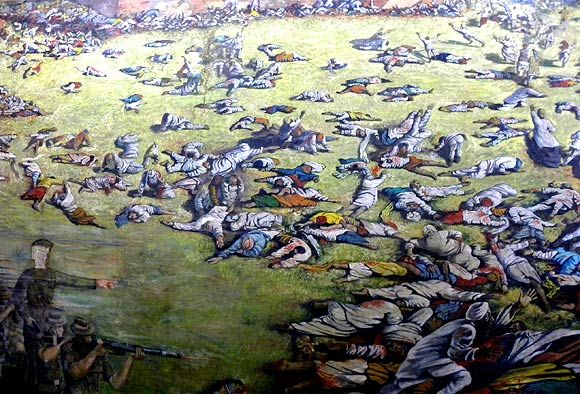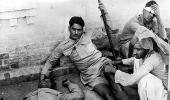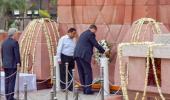From playing to the Sikh vote bank because Punjab elections are round the corner, to ensuring that a discordant 'us versus them' note was struck, whatever could be done to exploit every last drop of communal appeal, was done, observes Jyoti Punwani.

The inauguration of the renovated Jallianwala Bagh Memorial on August 28 should have been an inspiring moment. But, how could it, given that it was Narendra Modi who was inaugurating it?
From playing to the Sikh vote bank because Punjab elections are round the corner, to ensuring that a discordant 'us versus them' note was struck, whatever could be done to exploit every last drop of communal appeal, was done.
One would have thought that the inauguration of a complex devoted to the martyrs of Jallianwala Bagh would have started off with songs written about the incident. There are enough of them.
Dil Khoon ke Hamaarey, by an anonymous poet, was adopted by the Indian People's Theatre Association in 1943. It can be heard here (external link).
But the RSS-trained Modi would never invoke the Communist IPTA.
Then there's the song Jallianwala Bagh' by singer Hardeep Grewal. A Punjabi song would have been an added attraction, given the fulsome praise Modi lavished on Punjabis in his speech.
If nothing else, the verse Jallianwala Bagh ye dekho/yahan chali thi goliyan/yeh mat poocho kisne kheli/yahan khoon ki holiyan/, from Kavi Pradeep's popular film song Aao bacho/tumhein dikhaayein/jhaanki Hindustan ki, could have evoked patriotic feelings.
But none of these have the religious appeal that the Gurbani does. So this programme that had nothing to do with religion started with the Gurbani. The compositions of the Guru Granth Sahib appeal to both Punjabi Hindus and Sikhs, and though Modi's speech was meant for a national audience, for the Punjab elections, these two communities alone matter.
Then came the prefix 'Sardar' for two revolutionaries who are famous across the country just by their names shorn of any religious identity: Udham Singh and Bhagat Singh.
The prime minister's use of the religious marker 'Sardar' for Bhagat Singh reminds one of Khalistan supporters in the 1980s, who appropriated Bhagat Singh as a Sikh, changing his familiar clean-shaven image wearing a hat, to one wearing a turban with signs of a beard. Not quite a desirable association for a prime minister whose party members vilify the ongoing farmers' protest as Khalistani.
***
But after these blatant appeals to Sikh identity, came the real insult to the essence of Sikhism. Keeping the lessons in humanity taught by the Sikh Gurus in mind, said the prime minister, his government had brought in new laws to help 'our people (apney log) in distress'.
The PM was referring to the Citizenship (Amendment) Act, which grants citizenship to all persecuted minorities in our neighbouring countries, but specifically excludes Muslims.
The difference between helping only 'apney', and leaving out those considered 'not apney' is an idea completely contrary to what the Sikh Gurus taught.
Indeed, the story of Bhai Kanhaiya who gave water even to wounded and dying enemy soldiers during the siege of Anandpur by Mughal and Rajput forces exemplifies the teaching of the Gurus.
Summoned by Guru Gobind Singh after Sikhs complained to him that their precious water was being given to those who had attacked them, Bhai Kanhaiya said: 'I saw no Mughal or Sikh on the battlefield. I only saw human beings... they all have the same God's spirit. Guru Ji, have you not taught us to treat all God's people as the same?'
To which Guru Gobind Singh replied: 'You are right, you have understood the true message of Gurbani.' (external link).
What could be more antithetical to this teaching than the exclusionary CAA!
Bhagat Singh, whom the PM invoked more than once, would also have opposed this Act. After the spate of communal incidents in the 1920s, he wrote (external link) an essay Communal Riots and their Solutions, which was published in Kirti, the journal of the Workers and Peasants Party, in 1927.
The essay that began with the words: 'The condition of India has now become pathetic... The enmity between the people of religious groups has increased so much so, that to belong to one particular religion is reason enough for becoming enemy of the other religion', ended with an invocation of the Russian Revolution: 'Workers' rule got established... now no riots occur there, and everybody is considered a human being first and not a religious entity.'
The CAA does the opposite: It considers everybody first a religious entity and then a human being.

***
Maybe someone should have given the PM Bhai Kanhaiya's story and Bhagat Singh's essay before the inauguration, though it is doubtful these would have made any difference to the man who equated the horrors of Jallianwala Bagh with the horrors of Partition.
Is it believable that Modi does not know the difference between the brutality imposed by a colonial government on unarmed peaceful protesters, and the brutalities meted out to each other by frenzied mobs in the name of religion?
The PM made a specific mention of Punjab's suffering during Partition. Did he want Punjabis to link their memory of the martyrs of Jallianwala Bagh with the atrocities meted out to them by Muslims while being driven out of West Punjab?
What then of the atrocities meted out by Sikhs and Hindus that drove Punjab's Muslims to Pakistan? In 1941, the percentage of Muslims in East Punjab was 32.3; it had dropped to 0.8% by 1951.
Among the millions who fled to Pakistan was Barrister Khurshid A Hashmi.
When I met him in 2013, Hashmi was principal of the Sindh Muslim Law College in Karachi where my father had studied. He wept as he recounted how his father, a prominent Muslim Leaguer, had been hacked to pieces in August 1947. His mother was then just 26; his sister, who had witnessed the killing, would wake up screaming at night for years.
This same man took the trouble of getting his staff to hunt for my father's college admission forms though I didn't even know the year of admission, and gave me copies of them in an envelope with my father's name and the pre-Partition name of the college: S C Shahani Law College, printed on it.
An admirer of Ram Jethmalani, also an alumnus of the college, the principal hoped to meet the famous lawyer some day.
Without forgetting the horrors of Partition, Principal Hashmi rose above them to help a stranger from the country he was forced to leave, a member of an 'enemy' community. While recounting his terrible story, he didn't forget the Sikh neighbour who had persuaded his family to leave immediately, escorting them to a refugee camp in Jalandhar. Nor did he hesitate to introduce me to his wife, a proud Punekar who longed to hear Marathi.

***
There are many Hashmis in India. They embody what Rabindranath Tagore had said: 'I will never allow patriotism to triumph over humanity as long as I live.'
Recalling Tagore's words is important because in his speech on Jallianwala Bagh, the PM reminded us of the 'Partition Horrors Remembrance Day' to be observed on August 14, the very day our neighbour celebrates its Independence Day.
Tagore has a special relevance when we recall Jallianwala Bagh too. The poet returned his knighthood in protest against the incident.
But in his 20-minute speech paying homage to freedom fighters and all those affected by the massacre, the prime minister did not mention him once.










 © 2025
© 2025